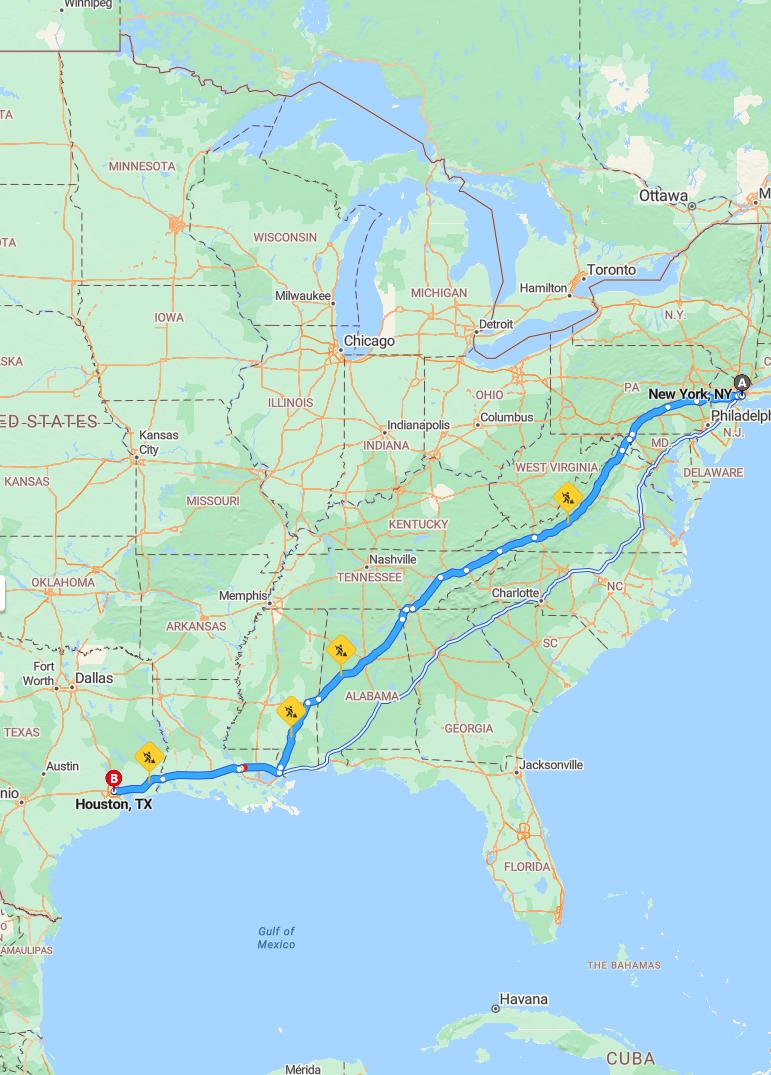Distance and estimated driving time
The road trip from New York to Houston covers approximately 1,627 miles, with an estimated driving time of about 23 hours and 12 minutes. Travelers primarily utilize the I-81 S and I-95 S highways for a direct and efficient route. Planning ahead is essential to ensure adequate rest stops and fuel breaks during this extensive journey. Proper preparation can help make the long drive safer and more comfortable.
Driving route
Embarking on a road trip from New York City to Houston, travelers will traverse a diverse array of states and landscapes. Starting in New York, the journey moves through New Jersey before entering West Virginia, known for its scenic Appalachian Mountains. Continuing southwest, the route progresses through Kentucky and Tennessee, offering a mix of cultural experiences and rolling hills. Crossing into Mississippi and Louisiana, travelers encounter Southern hospitality, vibrant music scenes, and rich culinary traditions. Finally, arriving in Houston, Texas, the trip culminates in a modern metropolis renowned for its space exploration, diverse cuisine, and dynamic energy.

Best time to start the trip
The optimal time to start your road trip from New York to Houston is early in the morning, ideally around sunrise, to maximize daylight hours and reduce night driving. Traveling in spring (April to June) or fall (September to November) offers milder weather and less traffic, enhancing safety and comfort. Avoiding major holiday weekends and peak travel seasons can help you steer clear of heavy congestion, especially around urban areas like New York City and Houston. Planning your departure on a weekday, early in the week, allows for a smoother journey through the varying climates and traffic conditions along the route.
Possible rest stops and accommodations
While driving from New York to Houston, travelers can enjoy a variety of rest stops and accommodations along the route. In New Jersey and West Virginia, numerous rest areas and service plazas offer convenient breaks with food, fuel, and restroom facilities. As you pass through Kentucky, Tennessee, and Mississippi, there are many hotels and motels in cities like Louisville, Nashville, and Jackson, providing comfortable overnight options. In Louisiana, cities such as Baton Rouge offer additional lodging choices, ensuring a restful stay before reaching Houston, Texas, where a wide range of accommodations is available to conclude the journey comfortably.
Traffic conditions and road closures
Driving from New York to Houston, travelers should be aware that traffic conditions can vary significantly along the route. Major highways, such as I-95 and I-10, may experience congestion during peak hours, especially near metropolitan areas like New York City and Houston. Additionally, occasional road closures or construction work are common in states like West Virginia, Kentucky, and Louisiana, which can lead to delays. It is advisable to check real-time traffic updates and plan for potential detours to ensure a smooth journey across these states.
Scenic routes and points of interest
Embarking on a road trip from New York to Houston offers an array of scenic routes and fascinating points of interest. Drivers can enjoy the picturesque landscapes of West Virginia's Appalachian Mountains, as well as Kentucky's rolling bluegrass fields, known for their vibrant beauty. Along the way, Nashville provides a vibrant music scene and rich cultural heritage, while Mississippi's historic sites offer a glimpse into the Deep South's history. Finally, entering Louisiana, travelers can experience the unique blend of cultures and the lively atmosphere of New Orleans before reaching their destination in Houston.
Weather forecast along the route
Traveling from New York to Houston, drivers should anticipate varied weather conditions along the route. Starting in New York, expect cooler temperatures and potential rain, especially during fall or winter months. As you move through West Virginia, Kentucky, and Tennessee, be prepared for possible thunderstorms and intermittent showers, typical of spring and summer seasons. Approaching Houston, warmer and more humid conditions are common, with the likelihood of thunderstorms or heavy rain, particularly during late spring and summer. Staying updated with local weather reports throughout the journey will help ensure safe and comfortable travel.
Vehicle preparation and safety checks
Before embarking on a long road trip from New York to Houston, it is essential to thoroughly prepare your vehicle to ensure safety and reliability. Conduct a comprehensive maintenance check, including tire pressure and tread, engine oil level, brake function, and fluid levels such as coolant and windshield washer fluid. Verify that all lights and signals are operational, and ensure your emergency kit, spare tire, and basic tools are accessible in case of unexpected issues. Regular safety checks not only enhance driving performance but also provide peace of mind as you navigate through multiple states on your journey.
Budgeting for fuel and tolls
When driving from New York to Houston, it's essential to plan your budget for fuel and tolls, as the trip involves multiple states with varying costs. Fuel expenses will depend on your vehicle's fuel efficiency and current gasoline prices, which can fluctuate, so estimating your total mileage and average consumption will help you allocate funds effectively. Toll costs may be significant, particularly in states like New Jersey and some parts of Tennessee, so it's wise to research toll rates and consider options such as EZ-Pass to streamline payments and potentially save money. By budgeting ahead for both fuel and tolls, you can ensure a smooth journey without unexpected financial surprises along the way.
Local laws and driving regulations
When driving from New York to Houston, drivers should be aware of varying local laws and driving regulations across states. Each state, including New Jersey, West Virginia, Kentucky, Tennessee, Mississippi, Louisiana, and Texas, has distinct traffic laws, such as speed limits, seat belt requirements, and restrictions on cell phone use while driving. It is important to familiarize oneself with these regulations beforehand to ensure compliance and avoid fines. Additionally, some states may have unique rules regarding alcohol impairment, vehicle inspection, and parking, so staying informed enhances safety and smooth travel throughout the journey.
